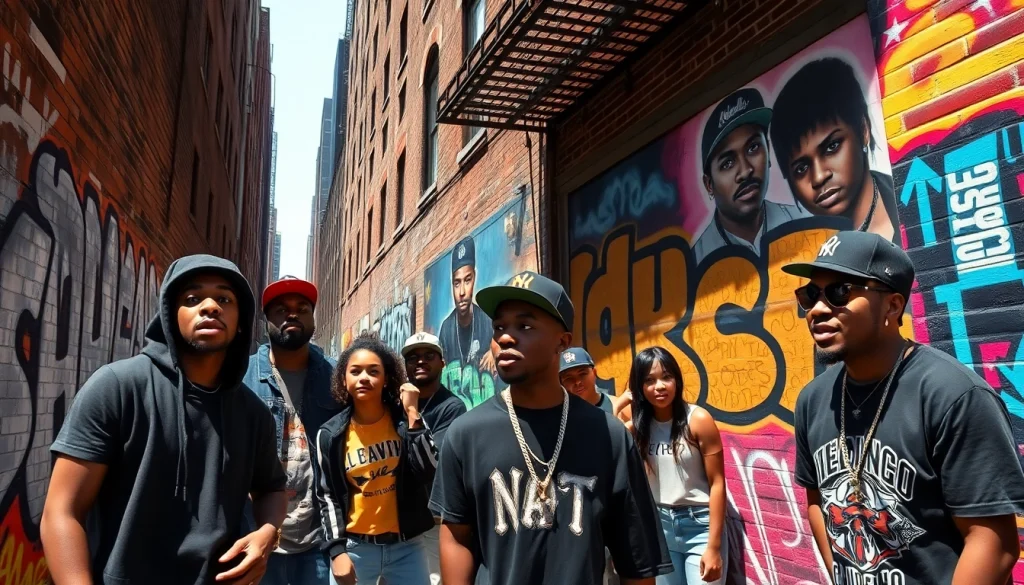The Roots of Rap Culture in Chicago
Historical Context and Influences
Chicago’s rap culture is deeply intertwined with the city’s historical narrative, urban struggles, and rich musical heritage. Emerging from a diverse cultural backdrop, the roots of rap trace back to the 1970s and 1980s, when genres like funk, soul, and jazz, which were pivotal in establishing Chicago’s music scene, became prominent. Artists began to weave their stories not only through rhythm but also through lyrical narratives that reflected their lives in an urban environment characterized by economic disparity and social conflicts.
This vibrant historical context laid the groundwork for hip-hop’s arrival in Chicago. The scene gained momentum in the 1980s with local clubs hosting breakdancing and DJ competitions. As pioneers introduced elements like sampling, Chicago vividly began contributing its unique flavor to hip-hop. Groups like The Chicago Gangster Disciples and Common Sense emerged, marking the beginning of a rich tapestry of narratives that defined local art.
Key Artists and Their Contributions
Chicago boasts a plethora of influential hip-hop artists who have shaped the genre over the years. Common and Lupe Fiasco have become synonymous with thoughtful lyricism and social consciousness, using their platforms to address issues like poverty, violence, and systemic racism. Their contributions have elevated Chicago’s reputation as a breeding ground for impactful storytelling in hip-hop.
In contrast, the emergence of Derrick “D2” Dorsey and G Herbo marked the infiltration of a more aggressive and street-centric form of rap that would come to define the city’s more recent hip-hop identity. These artists narrate gritty realities, giving voice to their experiences while simultaneously producing tracks that resonate with wider audiences. Other important figures include Chance The Rapper, who has harnessed social media to create a grassroots movement, proving that independent artists can thrive outside traditional record label systems.
The Impact of Local Communities
The local community has played a crucial role in shaping rap culture in Chicago. Grassroots organizations and collectives have emerged to support burgeoning talent, providing spaces for creativity and expression. Initiatives such as the Rap culture in Chicago educational workshops and open mic nights have solidified social ties among artists and fans alike.
These community-driven efforts not only foster artistic development, but they also promote understanding and solidarity among diverse groups. As rappers tell their unique stories through their verses, their lyrics often call attention to broader societal issues affecting their neighborhoods, culminating in a culture that transcends mere entertainment.
The Rise of Drill Music: A New Era
Understanding Drill’s Origins
Drill music, which emerged in the early 2010s, marked a significant evolution within Chicago’s hip-hop scene. Rooted in trap and cloud rap, it embodies the hard-hitting realities of life in the streets. The genre is characterized by violent, gritty lyrics coupled with dark, aggressive beats that echo the tumultuous experiences of the artists. Originating predominantly from neighborhoods like Englewood and the South Side, drill music serves as both an expression of cultural identity and a reflection of urban strife.
During this period, YouTube became a pivotal platform for artists to share their music, leading to a surge in popularity for drill. The genre’s harsh aesthetic resonates with young people dealing with systemic issues, allowing them to engage in a form of cathartic self-expression while bringing attention to societal challenges. As such, drill music is about survival—artists navigate their harsh realities while providing a voice for others echoing similar sentiments.
Prominent Drill Artists and Their Influence
Notable drill artists like Chief Keef, King Von, and Fredo Santana have emerged as cultural icons, each contributing uniquely to the genre’s evolution. Chief Keef, often regarded as the face of drill music, put the genre on the national map with tracks like “I Don’t Like,” which garnered significant radio play and mainstream attention. His raw lyrical authenticity and charismatic style captured the struggles of inner-city life, making him a beacon of hope for aspiring young artists.
Similarly, King Von’s storytelling ability brought a new narrative layer to drill, offering detailed accounts of life on the streets. His untimely death shocked many, yet his legacy continues to inspire upcoming artists navigating their own difficult circumstances. By sharing personal tales intertwined with broader societal issues, these artists continue to shape perceptions of drill culture, influencing music trends nationwide.
Reactions from the Community and Media
The rise of drill music has sparked varied reactions from both the public and media. Critics often associate drill with violence, sensationalizing music videos that highlight aggressive themes. However, many supporters argue that drill serves as a mirror reflecting the realities of life in Chicago, breaking down stereotypes and challenging preconceived notions of urban communities.
Media portrayals frequently focus on the adverse aspects of drill music, neglecting the nuanced stories behind the lyrics. This has led to an ongoing debate about the balance between artistic expression and social responsibility. Some scholars and activists argue for a critical reassessment of how rap is perceived, advocating for a more compassionate understanding of the artists’ circumstances.
Cultural Significance of Chicago Rap
Rap as a Voice for the Marginalized
Chicago rap culture plays a vital role in providing a voice for marginalized communities, allowing artists to articulate the socio-political issues they face. Through powerful lyrics, many Chicago rappers address systemic inequalities, poverty, and the impact of gun violence on their communities. Rather than merely depicting stark realities, they offer narratives filled with hope, resilience, and community solidarity.
Artists like Noname and Vic Mensa delve into the social and political dimensions of life in Chicago, using their music to spark conversations about important community issues. They leverage their platforms to advocate for change and uplift voices that often go unheard, emphasizing the power of rap as a transformative art form.
Collaboration and Community Engagement
Collaboration among artists is another hallmark of Chicago’s rap culture, fostering an environment where creativity thrives. Collective efforts have led to collaborations across genres, breaking traditional boundaries within the music industry. Notably, initiatives like The Social Experiment, helmed by Chance The Rapper, focus on creating a collaborative ecosystem where artists support one another, share resources, and elevate collective voices.
Furthermore, local events such as the annual Lollapalooza and street festivals provide a platform for emerging artists to showcase their talents, often alongside established acts. These collaborative spaces promote cultural exchange, allowing diverse musical styles to flourish and enabling artists to engage directly with their fan base.
Social Media’s Role in Shaping Perceptions
In the age of digital technology, social media has transformed the landscape of rap culture in Chicago. Websites and platforms like Instagram, TikTok, and Twitter facilitate rapid dissemination of music and visuals, empowering artists to reach wide audiences without the need for major label support. This accessibility has allowed a new wave of artists to emerge, each adding fresh perspectives to the genre.
Moreover, social media has served as an invaluable tool for activism, with Chicago rappers leveraging their platforms to raise awareness about social issues and organize community events. By engaging with their followers in real-time, artists create interactive spaces where dialogue around social justice continues, forging a cultural significance that extends beyond the realm of music.
Challenges Faced by Chicago Rappers
Violence and its Impact on the Scene
Despite its cultural vibrancy, the Chicago rap scene faces numerous challenges, primarily stemming from the pervasive violence that plagues the city. Many artists become symbols of hope for their communities, but the violence can present lethal consequences. High-profile figures such as King Von and Fredo Santana faced violent deaths, leaving the community and fans grappling with loss and grief.
This violence engenders a complicated relationship between the art form and real-life gun violence, compelling artists to navigate personal safety while producing music. The struggle for many is to remain true to their roots while facing the possibility of tragedy—a reality that influences artistic expression.
Industry Barriers and Opportunities
The music industry presents unique barriers for Chicago rappers, particularly artists from underprivileged backgrounds. Securing record deals, gaining national exposure, and breaking into an already saturated market can prove monumental challenges. While independent distribution channels have emerged, many artists still find it difficult to access the resources necessary for success.
However, there are also transformative opportunities within the landscape. The rise of digital platforms allows artists to connect with fans directly, promoting their music independently. This evolution empowers creators to bypass traditional barriers, bolstering self-reliance and resilience. By embracing these tools and making opportunities from limitations, Chicago rappers leverage their unique stories to resonate with a global audience.
Mitigating Negative Stereotypes
One of the ongoing challenges faced by Chicago rappers is the stigmatization that accompanies their art form. The genres often receive scrutiny for promoting violence, leading to harmful stereotypes about the communities they represent. Through strategic narrative shifts, artists are now attempting to reshape these perceptions, urging audiences to look beyond the surface.
Educational initiatives and collaborations with community organizations are playing a significant role in mitigating negative stereotypes. By promoting positive narratives and focusing on growth, resilience, and creativity, the rap culture in Chicago can foster a more nuanced understanding of the city’s complexities.
The Future of Rap Culture in Chicago
Emerging Trends and New Artists
As Chicago rap culture continues to evolve, emerging trends and aspiring artists signal an exciting future. New subgenres and styles have begun to surface, reflecting the dynamic nature of the city’s music landscape. Artists are experimenting with sounds, blending elements of rap with jazz, soul, and electronic music, resulting in innovative and diverse sonic textures.
Additionally, a younger generation of artists is becoming increasingly vocal about social issues affecting their communities. This focus on activism, coupled with artistic prowess, is attracting attention from both national audiences and major labels. With platforms promoting inclusivity, the future of Chicago rap appears to be not just about music but also about facilitating dialogues around social change.
How Chicago is Shaping Nationwide Hip-Hop
Chicago’s influence on the national hip-hop scene is profound and enduring. As artists from the city ascend to prominence, they bring their distinctive sounds and stories, challenging and reshaping the norms of hip-hop culture. The fusion of various genres and styles is leading to a more expansive understanding of what hip-hop can entail.
Furthermore, initiatives from Chicago-based artists to mentor and uplift the youth in their communities can inspire similar movements nationwide. By engaging directly with the issues at hand and creating platforms for underrepresented voices, Chicago rappers continue to impact broader music landscapes.
Preserving Heritage through Education and Museums
Preserving the rich heritage of Chicago rap culture is vital for future generations. Museums and archival projects dedicated to documenting the history and evolution of hip-hop in Chicago are essential in maintaining the legacy. Institutions like the Chicago Hip Hop Heritage Museum celebrate the artistic contributions while offering educational opportunities for the younger generation to learn about their roots and history.
Furthermore, partnerships across schools, community organizations, and artists can foster programs that educate youth about rap’s cultural significance, promoting a greater understanding of the genre and its impact. By engaging in educational initiatives, Chicago can ensure that its rap culture not only survives but thrives in the years to come.





